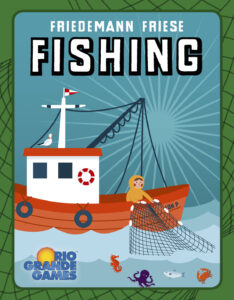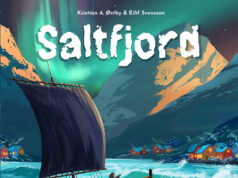 Designer Friedemann Friese is back with another “F” titled game, a naming convention that, save for a spattering of titles, has remained consistent since at least 2010. Friese is known for titles such as Friday, Fabled Fruit, and the “F”-less Power Grid.
Designer Friedemann Friese is back with another “F” titled game, a naming convention that, save for a spattering of titles, has remained consistent since at least 2010. Friese is known for titles such as Friday, Fabled Fruit, and the “F”-less Power Grid.
With the 2024 release of Fishing, Friese has returned to the realm of trick-taking with a new twist—the ocean. With that said, what surprises are in store for us in the depths of the ocean? And who among us is willing to catch the most tricks?
Gameplay Overview:
Fishing takes the standard trick-taking method of must-follow gameplay. It begins simple enough. There are four suits of cards, ranging from numbers one to ten (fewer numbers in lower player count games). And players seek to win tricks by playing the highest number of the lead suit.
Or do they?
Players compete for tricks over eight rounds by playing out their entire hand. Winners take all cards in the trick and add them to their “catch” card. Each card becomes a point at the end of the round. Catch cards also become the player’s available cards for the next round of tricks.

Subsequent rounds increase the number of cards drawn from the player’s caught cards. If a player wins all the tricks in the first round, for example, they will have a substantial number of cards to draw from their shuffled “boat” deck (where your caught cards go after the round is over). All other players need a hand of cards, so they must draw from the ocean deck.
The ocean deck is the true twist of the game. There are five levels of depth in the ocean deck, and each level provides more powerful cards to assist with winning tricks in upcoming rounds. This deck becomes a primary source of balance around taking tricks. It also becomes the pool of resources that players desperately want to help them win points, though with every win it becomes harder to access the ocean deck.
The ocean deck adds new wrinkles to each round. There are green trump cards. There are numbers that go beyond ten (and beyond even eleven). There are special ability cards (buoys) with no suit that make players pass cards or take a card from the winning trick as a sneaky point, or even adjust the game state so that the lowest number wins the trick.
The game ends either after eight rounds of play or when the ocean deck is depleted. Points are tallied for the final round, and the winner is the player with the most points.

Game Experience:
This is a simple-to-teach game that provides a little strategy, a little luck, and a lot of balance. And it has a gentle ramping as new cards are introduced into the ecosystem from the ocean deck. Players must balance how many points they feel they need while also finding a way to draw into the ocean deck so that they are not left behind in upcoming rounds.

I’ve found that with all my plays, from three to five players, the scoring has been quite close. The way that players vie for balance determines a lot of the “what” and “where” in the card pool. Also, players who are greedy early find their boat filled with early-game cards that are slowly power-crept out of usefulness. Who knew fishing required so much planning?
The crux of the system is the boat pile. Those early greed players are going to hate this pile, as they must draw from it at the beginning of every round. And new catches go to the bottom of the deck, only to be seen again once the earlier catches are drawn. It isn’t always a disadvantage, but it can feel rough early on when everyone else at the table is getting points.

The special cards add a little flavor to the mix, as do the slow drip of trump cards that find their way into your deck. I’ve enjoyed tossing negative point cards into the mix as a catch-up attempt, as well as taking points from another’s win or even switching the value of the winning card in the trick. The struggle is then watching the person who won the trick now take those cards into their catch pile, their use to be targeted at you in a future round.
Based on how close the scoring can be with this game, there can be a sense of the system playing itself out without much agency. I do think there’s enough decision space here to make sessions meaningful, and final rounds can be rather tense as cards appear that you’d forgotten were buried in other players’ boats.
My biggest hang-up with the game is the length. The box indicates 40 minutes, and this seems a little excessive for a trick-taking game. I personally feel that it could trim two rounds out of the system and find a better balance of gameplay vs. length. There is a little weariness of playing out eight rounds of tricks—a typical trick-taking game lasts as many rounds as the number of players at the table.
Beyond length, which I do feel is a major factor in consideration of purchasing this product for the niche it fills, the only other detractor for my personal taste was the iconography on the special ocean cards. Thankfully there’s a helpful aid for all players, but I did find myself referring to it often to remind myself of what it was indicating.
Final Thoughts:
The core system is fun. Do I want to take this trick for points? Or do I want to wait it out for more powerful cards for later rounds? Even if in the end it comes down to a very small scoring spread, the decisions are still impactful. I am deducting stars due to the length. It truly overstays its welcome, enough to make me curious about how to adjust the number of rounds and the number of cards in each level of the ocean. Regardless, Fishing is interactive from round to round, and with a focused group, can become a filler-plus for your gaming table for years to come.
Final Score: 3.5 stars – Fishing is fun, but can’t seem to land the perfect catch.
 Hits:
Hits:
• Balanced design
• Trick decision space
• Ocean unknowns
Misses:
• Game length
• Buoy iconography























We got this recently and it’s been a big hit for all we’ve taught it to. Is it longer than a lot of other trick takers? Sure, but I see that as a positive. You have time to develop a strategy with regards to gaining quick points vs getting fresh cards. I like that aspect of it. It’s not out of line with another popular truck taker, Skull King. Either way, this one has been a winner for us.